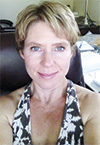“Not only do I know how to milk a cow, but I know how to herd a bunch of cows, too, which is a life skill that I think may come in handy someday.” —Martina McBride
Last year, I wrote an article that sought to solve the mystery of why only one woman is serving on the board for both the Idaho Dairy Products Commission and Idaho Dairymen’s Association, a number that, sadly, remains unchanged.
This year, I have noticed another area in the industry void of female participation. Abuse videos. I have yet to watch a dairy abuse video in which a woman is the abuser.
Because I am an advocate for women in agriculture, you may be expecting me to get on my high horse and demand that women are included in all aspects of the dairy farm – and that not allowing women to serve in the role of animal abuser for abuse videos on the farm strongly suggests once again the gender inequalities that exist. Wrong. This is one aspect of the dairy industry where I am proud to say that women aren’t participating.
The Bureau of Labor Statistics reports that in the general category of animal production, 25 percent of the employees are women. Statistically, then, one might expect that 25 percent of the abuse videos released would expose a female abuser.
Many women working on dairy farms, both large and small operations, milk cows, raise calves and tend to the management of close-up or sick cows, as well as other tasks. These are the very areas of the farm where abuse videos are often shot.
Not only do women work on dairies, they also own them – usually alongside their husbands. However, in my observation, the larger dairy operations get, the less likely it is that these female owners are participating in day-to-day operations at the barn, and I sincerely believe this lack of female presence is contributing to a culture that in some cases allows for animal abuse to take place.
Gender stereotypes tell us that women are less inclined toward abuse; roles for women – whether they work outside of the home and farm or not – place us as the givers of life, supporting our families and nurturing our spouses, our children and our pets.
The reality is this: Treating our animals humanely is the right thing to do. If abuse isn’t taking place, then there is a much lower possibility for an undercover video, and women are much less likely to tolerate abuse or abuse an animal themselves.
Additionally, consumers require that animal abuse doesn’t exist on our farms. Otherwise, we won’t be able to market and sell our product to the men and women who decide whether or not to buy it. It is that simple.
Because dairy farm women share both a woman’s perspective and the perspective inherent as a part of the dairy farm, women are the key to educating everyone on the farm about what is not tolerable and what is acceptable.
Women can serve as outreach to the greater community increasing understanding between rural and urban populations, and they are crucial to changing an individual farm culture if animal care and welfare problems exist. Detaching ourselves from our farms or exhibiting an attitude that “what happens on the dairy stays at the dairy” doesn’t work. Not today nor in the future.
Animals are understandable beings with predictable behaviors and reactions to different styles of human handling. All employers and employees should take dairy stockmanship and handling training in order to peacefully and successfully care for these animals and to understand these behaviors.
I believe this hands-on education for ourselves and our employees can only be beneficial – not just to show consumer groups that we care for our animals but to actually improve the way we do.
Finding and implementing this hands-on education is the task I have set before myself on our farm. We value our employees because our farm simply couldn’t exist without their efforts.
By giving them the opportunity to educate themselves about animal behavior and how to peacefully handle animals, we are communicating just how important animal welfare is on our farm. PD
Rebecca Lampman lives with her husband and three children on their 250-cow dairy farm in Bruneau, Idaho. She is working with dairy stockmanship specialists, educators and dairy extension specialists to offer a hands-on three-day animal handling and welfare course for the dairies in her area.




